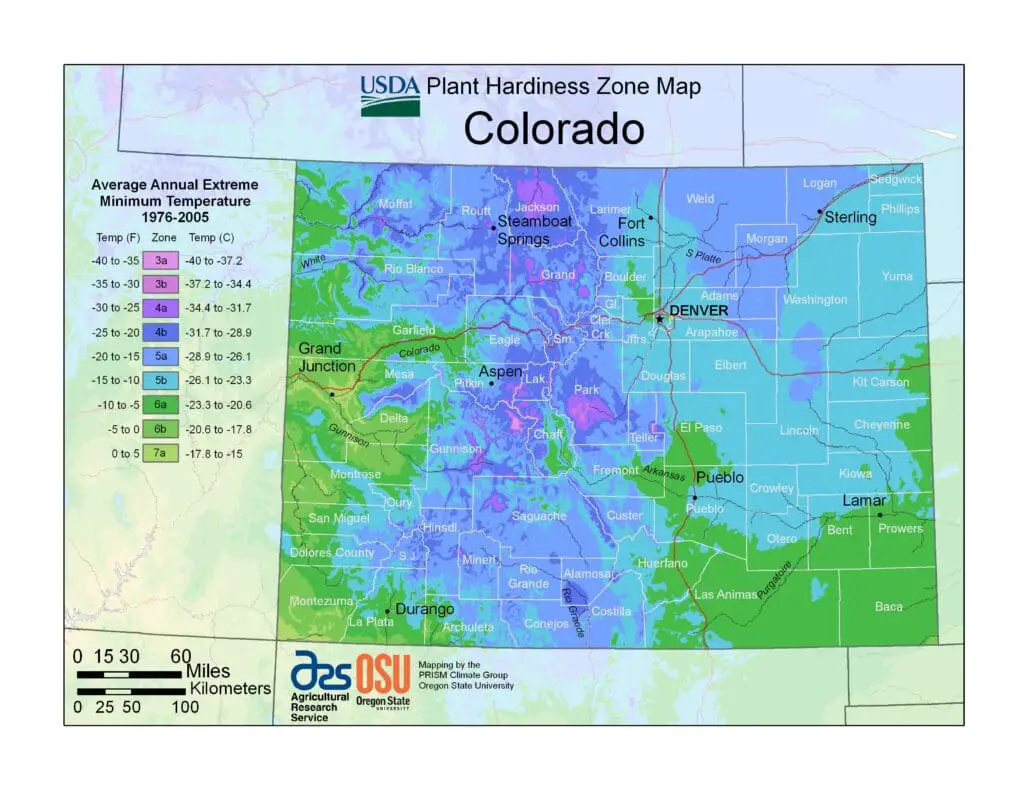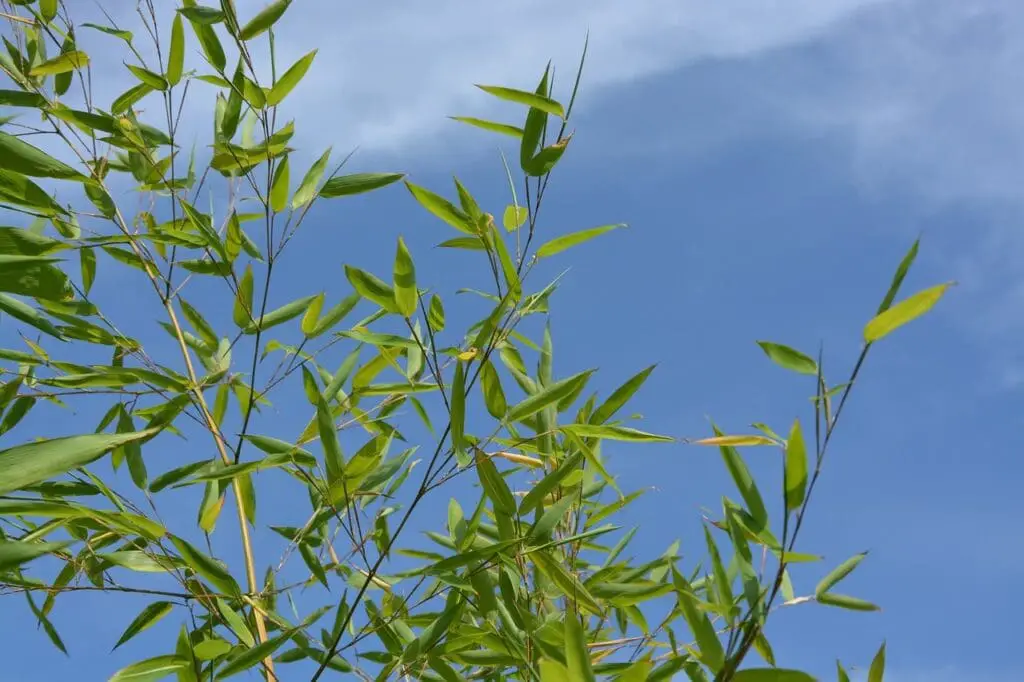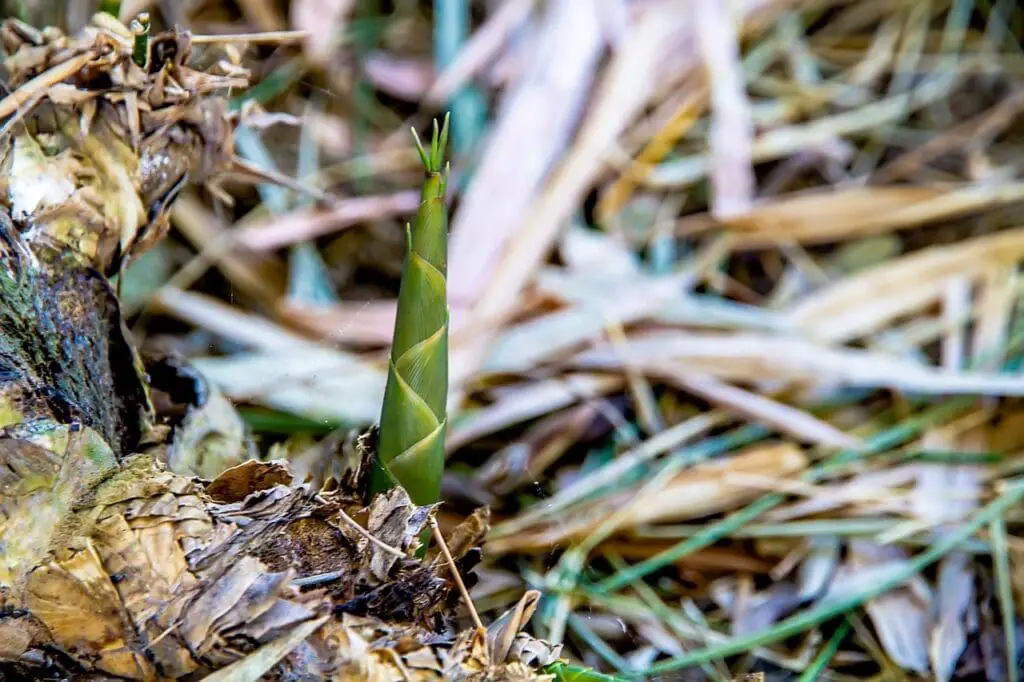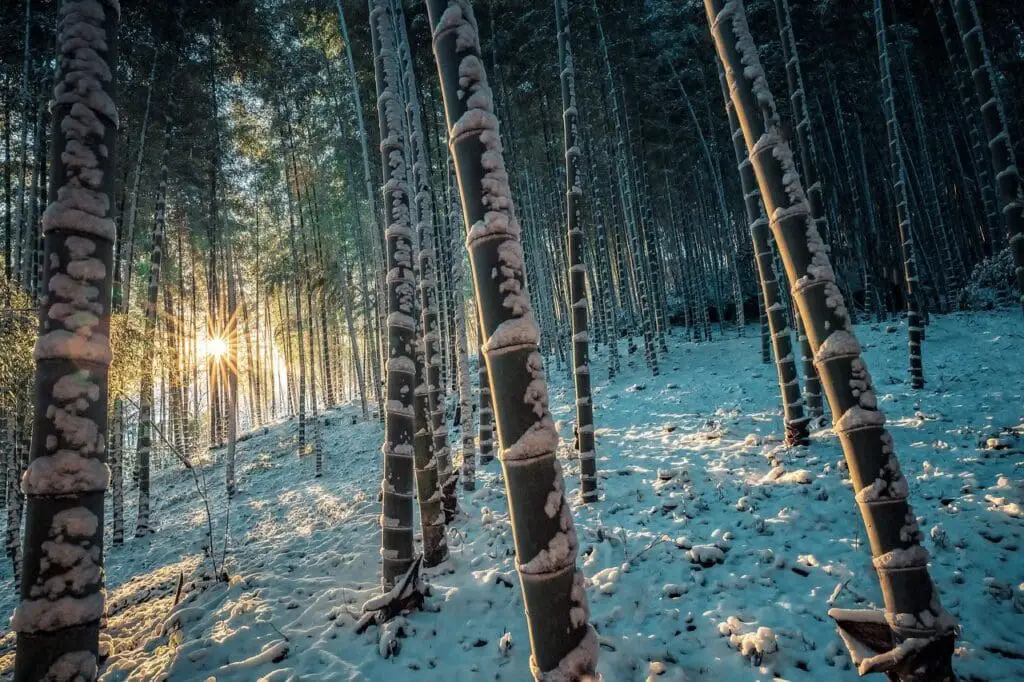Bamboo has the potential to grow in Colorado’s challenging climate. Despite the state’s high altitudes and freezing temperatures, there are cold hardy varieties of bamboo that can tolerate even the harshest conditions.
However, it is crucial to choose the right bamboo species for Colorado’s specific USDA Hardiness Zone, which ranges from 3 to 7. Running bamboos like Phyllostachys aureosulcata, Phyllostachys heteroclada f. solida, and Phyllostachys bissetii are popular choices for their cold tolerance but may require containment due to their invasive nature. Clumping bamboos such as Fargesia murielae, Fargesia nitida, and Fargesia dracocephala are also suitable options.
Proper care techniques including mulching and winter protection are essential for bamboo survival during harsh winters. Moreover, bamboo offers numerous benefits such as construction materials, furniture production, and textiles while being a renewable resource that aids in reducing carbon dioxide levels in the atmosphere.
Key Takeaways
-
Bamboo can be grown in Colorado, even in high altitudes and freezing temperatures.
-
There are both running and clumping varieties of bamboo available for planting, with running bamboos being more cold hardy.
-
Proper mulching and protection is important for bamboo to survive the cold winter.
-
Different bamboo species are suitable for different USDA Hardiness Zones in Colorado.
Can Bamboo Survive in Colorado?
Bamboo can successfully thrive in the challenging climate of Colorado, with its high altitude, cold winters, and arid conditions, by selecting suitable cold-hardy varieties and implementing proper care techniques.
When planting bamboo in Colorado, it is important to consider the specific growth requirements of this versatile plant. Bamboo thrives in well-drained soil with a slightly acidic to neutral pH level. Adequate watering is necessary to maintain consistent moisture levels, but the plant should not be overwatered. Mulching with bark or wood chips can help keep bamboo roots warm during winter. Additionally, bamboo prefers partial shade and protection from strong winds.
Landscaping ideas for bamboo in Colorado include using it as natural screening or creating a tropical atmosphere in gardens. Its fast growth rate and ability to absorb carbon dioxide make it an ideal choice for sustainable gardening practices.
Climate and Soil Considerations
The unique climate and challenging conditions in Colorado, including high altitude, cold winters, and arid climate, can pose challenges for cultivating certain plant species. When considering the suitability of bamboo in this region, it is important to understand its growing conditions and requirements.

Bamboo requires well-drained soil with a slightly acidic to neutral pH level. Soil preparation should include mixing clay soils with compost to improve drainage and fertility.
Altitude considerations are crucial as some bamboo varieties may not tolerate higher elevations. Cold tolerance is another important factor to consider when choosing bamboo species for Colorado’s climate.
Adequate watering is essential for bamboo growth, as it requires consistent moisture but should be planted in well-drained soil to avoid waterlogging. By carefully addressing these factors and providing proper care, bamboo can thrive in Colorado despite its challenging conditions.
Choosing Suitable Varieties
When selecting appropriate species of bamboo for cultivation in Colorado, it is crucial to consider factors such as cold hardiness, growth habit, soil and water requirements, and aesthetic appeal. Here are four important considerations when choosing suitable types of bamboo for Colorado:
-
Growing conditions: Bamboo requires specific growing conditions including temperature, sunlight, and water. It is essential to select bamboo species that can grow well in Colorado’s unique climate and challenging conditions.
-
Altitude considerations: Due to the high altitude in some parts of Colorado, certain bamboo species may not be suitable for cultivation. Local expert recommendations should be sought to ensure the chosen bamboo variety can tolerate the altitude.
-
Cold hardiness: Given Colorado’s cold winters, it is important to choose cold-hardy or temperate bamboo varieties that can withstand low temperatures and frost.
-
Aesthetic appeal: Consider the growth habit, size and space requirements, as well as the overall appearance of the bamboo species. This will help create a visually appealing landscape while meeting personal preferences.
Care and Maintenance Tips
To ensure the healthy growth and maintenance of bamboo in Colorado, proper care techniques should be implemented.
Bamboo requires regular pruning to remove dead or damaged canes and promote new growth. It is important to prune at ground level to prevent regrowth from lower nodes.



Additionally, a consistent watering schedule should be followed (particularly in the first year or two after planting), providing adequate moisture without waterlogging the soil.
Controlling the spread of bamboo is crucial, especially for running varieties, as they have vigorous rhizome root systems that can become invasive. This can be achieved by using root barrier systesm or growing bamboo in pots.
Fertilization methods such as applying a balanced slow-release fertilizer in early spring can help maintain optimal growth.
Winter Protection Measures
Winter protection measures for bamboo (especially less cold-hardy bamboo) in Colorado are essential to ensure its survival and prevent damage due to harsh winter conditions.
Insulating canes is an important step in protecting bamboo during the winter months. This can be done by wrapping the canes with layers of burlap or fleece, which helps to insulate them from freezing temperatures and strong winds.
Mulching techniques are also crucial for maintaining adequate soil temperature and moisture levels around the bamboo roots. Applying a layer of organic mulch such as bark or wood chips helps to regulate soil temperature and prevent frost heaving.
Additionally, using anti-desiccant sprays on the foliage can help reduce water loss through transpiration and minimize winter damage.
It is important to note that while bamboo does not require extensive watering during winter, it still needs some moisture to survive. Therefore, monitoring and providing winter watering requirements based on weather conditions is necessary for successful bamboo cultivation in Colorado’s cold climate.
Pest and Disease Management
Pest and disease management is an integral part of maintaining healthy and thriving bamboo plants in Colorado’s challenging climate. To ensure the well-being of bamboo in this unique environment, it is important to be aware of common pests and take preventative measures against diseases. Here are some key points to consider:
-
Common pests: Bamboo can attract various pests such as aphids, spider mites, and bamboo mites. These pests can cause damage by feeding on leaves or sucking sap from the plant.
-
Disease prevention: Regular inspection is crucial for identifying early signs of infestation or disease development. Good garden hygiene, including removing fallen leaves and plant debris, helps prevent pests and diseases.
-
Organic pest control: Insecticidal soaps and neem oil are effective options for controlling common bamboo pests without harming the environment.
-
Disease-resistant species: Choosing disease-resistant bamboo species can minimize susceptibility to fungal infections and other diseases, ensuring the longevity of your plants.
By implementing these pest management strategies, you can maintain healthy bamboo plants that will thrive in Colorado’s challenging climate.
Benefits and Uses of Bamboo
One of the remarkable features of bamboo is its versatility, as it offers numerous benefits and a wide range of uses in various industries and applications.
Bamboo’s advantages stem from its sustainability, as it is considered one of the most eco-friendly materials available. It has a rapid growth rate, with some species growing up to 3 feet per day, making it an excellent source for renewable resources. Additionally, bamboo has the ability to sequester large amounts of carbon dioxide and release oxygen into the atmosphere, contributing to climate change mitigation efforts.



In terms of applications, bamboo can be used for construction, furniture-making, textiles production, and even as a food source in some cultures. Its strength-to-weight ratio makes it suitable for structural purposes like building houses or bridges, while its natural beauty adds aesthetic appeal to various products.
Overall, bamboo’s benefits and diverse uses make it a valuable resource with significant potential for sustainable development.
Frequently Asked Questions
Q: Does bamboo grow in Colorado?
A: Yes, bamboo can grow in Colorado.
Q: What are the varieties of bamboo that can grow in Colorado?
A: Some of the bamboo species that can grow in Colorado include clump bamboo, yellow groove bamboo, umbrella bamboo, and fountain bamboo.
Q: What are the climatic conditions required for bamboo to grow in Colorado?
A: Bamboo plants require full sun and can tolerate colder climates, making them suitable for growing in Colorado.
Q: Can bamboo be grown in all parts of Colorado?
A: Yes, bamboo can be grown in various parts of Colorado, including Denver and the Colorado Rockies.
Q: What are the benefits of growing bamboo in Colorado?
A: Bamboo adds beauty to the landscape, can be used as a privacy screen, and provides a unique touch to gardens and outdoor spaces.
Q: What are the recommended bamboo varieties to grow in Colorado?
A: Some recommended bamboo varieties to grow in Colorado are golden sunshine bamboo, culm head bamboo, leaf bamboo, and water bamboo.
Q: Are there any limitations in growing bamboo in Colorado?
A: While bamboo can grow in Colorado, certain varieties of bamboo won’t thrive in the climatic conditions of the region.
Q: Can bamboo be grown as ground cover in Colorado?
A: Yes, bamboo can be grown as a ground cover in Colorado and is often used for this purpose.
Q: Can bamboo be grown in Colorado’s hardiness zones?
A: Yes, bamboo is suitable for various hardiness zones in Colorado.
Q: Can I grow bamboo if I live in Colorado and want to create a bamboo grove?
A: Yes, if you want to grow a bamboo grove in Colorado, there are several varieties of bamboo that will thrive in the region.
Conclusion
Bamboo can indeed thrive in Colorado, even in high altitudes and freezing temperatures. With the availability of cold hardy varieties, bamboos can be successfully grown in this region. By choosing the right species for the specific USDA Hardiness Zone and implementing proper care techniques such as mulching and winter protection, bamboo can withstand the harsh winters.

